Kikujiro 菊次郎的夏天 英文影评
《菊次郎的夏天》影评

《菊次郎的夏天》影评正男这个小鬼确实是幸运的。
尽管未能与母亲相认,但他遇到了“心地善良”的菊次郎。
然而,菊次郎先生最初并非是一个真正意义上的“好人”,他只是一个不学无术的市井之徒。
在故事开始时,菊次郎并不想带着正男去找他的妈妈,因为他对亲情淡漠,小时候母亲的离开似乎让他已经抹去了对母亲的感情。
但是,当妻子无意间说出对母亲不敬的话时,菊次郎还是毫不客气地说:“你不可以这样说我的妈妈。
”尽管是无奈地接受了妻子的安排,但菊次郎还是很关照小正男。
他制止了流氓对小正男的欺负,带着他住档次很好的宾馆。
虽然他自己也在玩乐,但他始终没有忘记自己的“任务”。
只是,他对任何人都是蛮横、霸道、不讲理的。
在乡村小站等待过路车的时候,菊次郎偷换了路人的食物给正男吃,自己的那份则藏了起来,并“故作可怜”地说:“大人有时是要为孩子牺牲的。
”然后他借故上厕所,跑到田边偷偷地吃。
在很多观众看来,这可能是菊次郎的虚伪,但在我看来,这只是菊次郎这个在日常生活中只能扮演小角色的人,想要在孩子心中树立高大美好的形象的一种方式。
他也渴望成为一个英雄。
在寻找小正男妈妈的路上,菊次郎慢慢地变得像个父亲一样。
一路上,他们经历了许多困难,遇到了许多善良热情的人,也遇到了一些冷漠自私的人。
最终,他们找到了正男亲生母亲的家。
正当他们要欣喜地和正男妈妈相认时,却发现这个女人已经有了新的家庭。
小正男伤心地跑开了。
同样失落的菊次郎不知道如何安慰心灵受到创伤的小正男,他从两个小混混那里抢来了“天使之铃”,并骗正男刚才的女人不是他的妈妈,他的妈妈已经搬走了,这铃是他妈妈留给他的。
孩子的思想总是单纯的,正男相信了菊次郎的“谎言”,小心翼翼地收起了铃铛。
为了让失落的小正男开心,菊次郎和另外三个只有一面之缘的男人带着他去野营。
这四个充满爱心的男人绞尽脑汁,一次又一次地逗乐了这个失去母亲的孩子。
他们在社会中都是微不足道的小人物,甚至是卑微的一群,但他们为了这个陌生的小男孩所做的一切是如此高尚,令人尊敬。
《菊次郎的夏天》影评
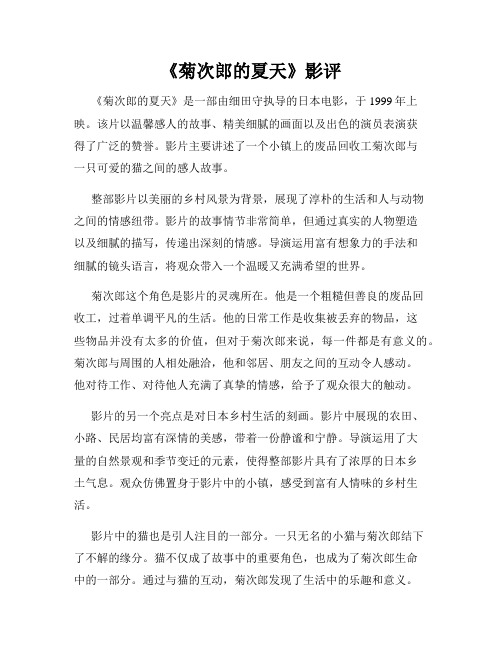
《菊次郎的夏天》影评《菊次郎的夏天》是一部由细田守执导的日本电影,于1999年上映。
该片以温馨感人的故事、精美细腻的画面以及出色的演员表演获得了广泛的赞誉。
影片主要讲述了一个小镇上的废品回收工菊次郎与一只可爱的猫之间的感人故事。
整部影片以美丽的乡村风景为背景,展现了淳朴的生活和人与动物之间的情感纽带。
影片的故事情节非常简单,但通过真实的人物塑造以及细腻的描写,传递出深刻的情感。
导演运用富有想象力的手法和细腻的镜头语言,将观众带入一个温暖又充满希望的世界。
菊次郎这个角色是影片的灵魂所在。
他是一个粗糙但善良的废品回收工,过着单调平凡的生活。
他的日常工作是收集被丢弃的物品,这些物品并没有太多的价值,但对于菊次郎来说,每一件都是有意义的。
菊次郎与周围的人相处融洽,他和邻居、朋友之间的互动令人感动。
他对待工作、对待他人充满了真挚的情感,给予了观众很大的触动。
影片的另一个亮点是对日本乡村生活的刻画。
影片中展现的农田、小路、民居均富有深情的美感,带着一份静谧和宁静。
导演运用了大量的自然景观和季节变迁的元素,使得整部影片具有了浓厚的日本乡土气息。
观众仿佛置身于影片中的小镇,感受到富有人情味的乡村生活。
影片中的猫也是引人注目的一部分。
一只无名的小猫与菊次郎结下了不解的缘分。
猫不仅成了故事中的重要角色,也成为了菊次郎生命中的一部分。
通过与猫的互动,菊次郎发现了生活中的乐趣和意义。
猫不会说话,但它通过眼神、举手投足传递出了许多情感。
观众在片中看到猫的可爱和调皮,不禁被它的魅力所吸引。
影片的音乐也是其成功的重要因素之一。
原声音乐与情节相得益彰,增强了观众对故事情感的共鸣。
音乐轻松而欢快,带给观众愉悦的听觉享受。
同时,影片的配乐也贴合场景的氛围,给人一种乡村生活的舒适感。
总的来说,《菊次郎的夏天》是一部充满温情和人文关怀的影片。
它通过真实而细腻的故事情节,让观众在感动之余也反思生活中的真善美。
影片通过对生活的描绘,营造了一种宁静而美好的氛围。
菊次郎的夏天影评(精选6篇)
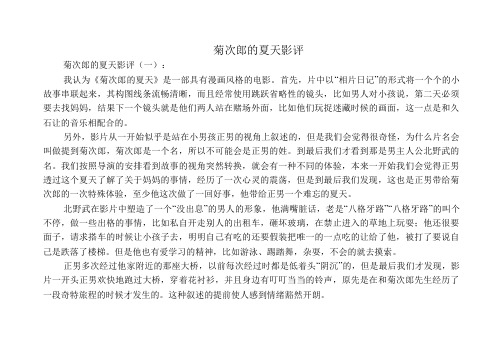
菊次郎的夏天影评菊次郎的夏天影评(一):我认为《菊次郎的夏天》是一部具有漫画风格的电影。
首先,片中以“相片日记”的形式将一个个的小故事串联起来,其构图线条流畅清晰,而且经常使用跳跃省略性的镜头,比如男人对小孩说,第二天必须要去找妈妈,结果下一个镜头就是他们两人站在赌场外面,比如他们玩捉迷藏时候的画面,这一点是和久石让的音乐相配合的。
另外,影片从一开始似乎是站在小男孩正男的视角上叙述的,但是我们会觉得很奇怪,为什么片名会叫做提到菊次郎,菊次郎是一个名,所以不可能会是正男的姓。
到最后我们才看到那是男主人公北野武的名。
我们按照导演的安排看到故事的视角突然转换,就会有一种不同的体验,本来一开始我们会觉得正男透过这个夏天了解了关于妈妈的事情,经历了一次心灵的震荡,但是到最后我们发现,这也是正男带给菊次郎的一次特殊体验,至少他这次做了一回好事,他带给正男一个难忘的夏天。
北野武在影片中塑造了一个“没出息”的男人的形象,他满嘴脏话,老是“八格牙路”“八格牙路”的叫个不停,做一些出格的事情,比如私自开走别人的出租车,砸坏玻璃,在禁止进入的草地上玩耍;他还很要面子,请求搭车的时候让小孩子去,明明自己有吃的还要假装把唯一的一点吃的让给了他,被打了要说自己是跌落了楼梯。
但是他也有爱学习的精神,比如游泳、踢踏舞,杂耍,不会的就去摸索。
正男多次经过他家附近的那座大桥,以前每次经过时都是低着头“阴沉”的,但是最后我们才发现,影片一开头正男欢快地跑过大桥,穿着花衬衫,并且身边有叮叮当当的铃声,原先是在和菊次郎先生经历了一段奇特旅程的时候才发生的。
这种叙述的提前使人感到情绪豁然开朗。
菊次郎的夏天影评(二):关于童年,关于成长,关于夏天。
甚至,关于爸爸。
我不明白孩子们是不是看懂了《菊次郎的夏天》。
也许正像一个十一岁的小女孩说的那样:“我没什么感触,我只是觉得电影拍的很好玩。
”小正男是孤独的。
他想他的妈妈,以及他的爸爸。
但是他的身边,只有自己的奶奶。
《菊次郎的夏天》影评
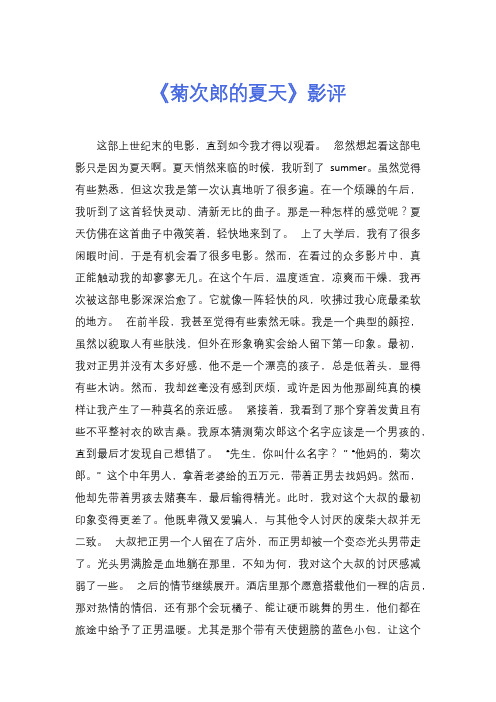
《菊次郎的夏天》影评这部上世纪末的电影,直到如今我才得以观看。
忽然想起看这部电影只是因为夏天啊。
夏天悄然来临的时候,我听到了summer。
虽然觉得有些熟悉,但这次我是第一次认真地听了很多遍。
在一个烦躁的午后,我听到了这首轻快灵动、清新无比的曲子。
那是一种怎样的感觉呢?夏天仿佛在这首曲子中微笑着,轻快地来到了。
上了大学后,我有了很多闲暇时间,于是有机会看了很多电影。
然而,在看过的众多影片中,真正能触动我的却寥寥无几。
在这个午后,温度适宜,凉爽而干燥,我再次被这部电影深深治愈了。
它就像一阵轻快的风,吹拂过我心底最柔软的地方。
在前半段,我甚至觉得有些索然无味。
我是一个典型的颜控,虽然以貌取人有些肤浅,但外在形象确实会给人留下第一印象。
最初,我对正男并没有太多好感,他不是一个漂亮的孩子,总是低着头,显得有些木讷。
然而,我却丝毫没有感到厌烦,或许是因为他那副纯真的模样让我产生了一种莫名的亲近感。
紧接着,我看到了那个穿着发黄且有些不平整衬衣的欧吉桑。
我原本猜测菊次郎这个名字应该是一个男孩的,直到最后才发现自己想错了。
“先生,你叫什么名字?”“他妈的,菊次郎。
”这个中年男人,拿着老婆给的五万元,带着正男去找妈妈。
然而,他却先带着男孩去赌赛车,最后输得精光。
此时,我对这个大叔的最初印象变得更差了。
他既卑微又爱骗人,与其他令人讨厌的废柴大叔并无二致。
大叔把正男一个人留在了店外,而正男却被一个变态光头男带走了。
光头男满脸是血地躺在那里,不知为何,我对这个大叔的讨厌感减弱了一些。
之后的情节继续展开。
酒店里那个愿意搭载他们一程的店员,那对热情的情侣,还有那个会玩橘子、能让硬币跳舞的男生,他们都在旅途中给予了正男温暖。
尤其是那个带有天使翅膀的蓝色小包,让这个略显木讷的小男生瞬间变得像一个小小的天使。
“小子,要乖哦”大叔被一群流氓殴打,他却谎称自己是从楼梯上摔下来的。
而当正男看到大叔受伤后,他穿过黎明中的长长街道,敲响药店的卷帘门为他买药。
英语作文介绍一首歌菊次郎的夏天
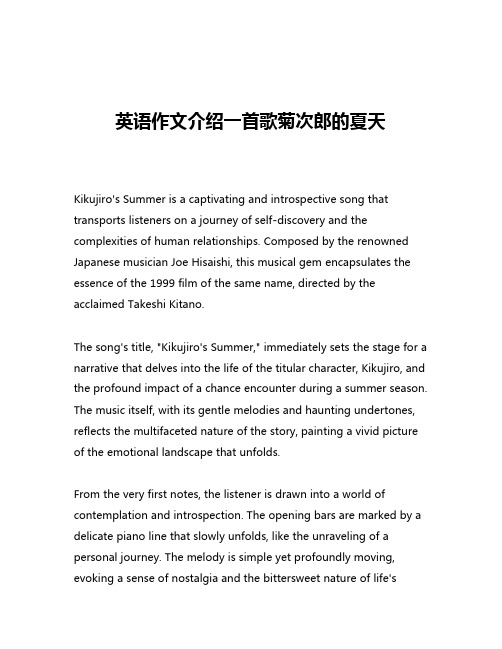
英语作文介绍一首歌菊次郎的夏天Kikujiro's Summer is a captivating and introspective song that transports listeners on a journey of self-discovery and the complexities of human relationships. Composed by the renowned Japanese musician Joe Hisaishi, this musical gem encapsulates the essence of the 1999 film of the same name, directed by the acclaimed Takeshi Kitano.The song's title, "Kikujiro's Summer," immediately sets the stage for a narrative that delves into the life of the titular character, Kikujiro, and the profound impact of a chance encounter during a summer season. The music itself, with its gentle melodies and haunting undertones, reflects the multifaceted nature of the story, painting a vivid picture of the emotional landscape that unfolds.From the very first notes, the listener is drawn into a world of contemplation and introspection. The opening bars are marked by a delicate piano line that slowly unfolds, like the unraveling of a personal journey. The melody is simple yet profoundly moving, evoking a sense of nostalgia and the bittersweet nature of life'sexperiences.As the song progresses, the instrumentation gradually expands, introducing a range of instruments that blend seamlessly to create a rich and textured soundscape. The inclusion of strings, woodwinds, and percussion add depth and complexity to the composition, mirroring the layers of emotion and character development within the film.One of the most striking aspects of "Kikujiro's Summer" is its ability to convey a wide spectrum of emotions through the music alone. The gentle rise and fall of the melody, the subtle shifts in tempo and dynamics, and the interplay between the various instruments all contribute to a sense of emotional resonance that transcends the boundaries of language.At times, the music evokes a sense of melancholy and introspection, capturing the loneliness and isolation that Kikujiro and the young protagonist, Masao, experience throughout their journey. The haunting quality of the piano and the mournful tones of the strings create a palpable atmosphere of contemplation and self-reflection.However, the song also encompasses moments of joy, wonder, and the discovery of unexpected connections. The introduction of upbeat rhythms and vibrant melodies suggests the awakening of newperspectives and the forging of unexpected bonds between the two central characters. This duality of emotions reflects the complexities of the human experience, where joy and sorrow, hope and despair, often coexist in a delicate balance.One of the most remarkable aspects of "Kikujiro's Summer" is its ability to transport the listener beyond the confines of the film and into a realm of universal human experiences. The song's evocative power transcends cultural boundaries, allowing it to resonate with audiences from diverse backgrounds. The universal themes of loneliness, self-discovery, and the power of human connection are woven seamlessly into the musical fabric, creating a work that speaks to the shared experiences of the human condition.Moreover, the song's structure and composition are masterfully crafted, with Hisaishi's expertise as a composer shining through. The seamless transitions between the various musical motifs, the subtle variations in tempo and rhythm, and the interplay between the different instrumental sections all contribute to the song's captivating and immersive quality.As the listener journeys through the course of "Kikujiro's Summer," they are transported into a world of introspection and emotional depth. The music serves as a conduit for the exploration of the human psyche, inviting the listener to reflect on their ownexperiences and the complexities of relationships.In conclusion, "Kikujiro's Summer" is a masterful composition that transcends the boundaries of its cinematic origins. Through its evocative melodies, rich instrumentation, and emotional resonance, the song becomes a universal language that speaks to the depths of the human experience. It is a testament to the power of music to convey the nuances of the human condition and to connect individuals across cultural divides. Hisaishi's remarkable work stands as a testament to the enduring impact of music as a medium for exploring the complexities of the human experience.。
菊次朗的夏天歌曲的作文
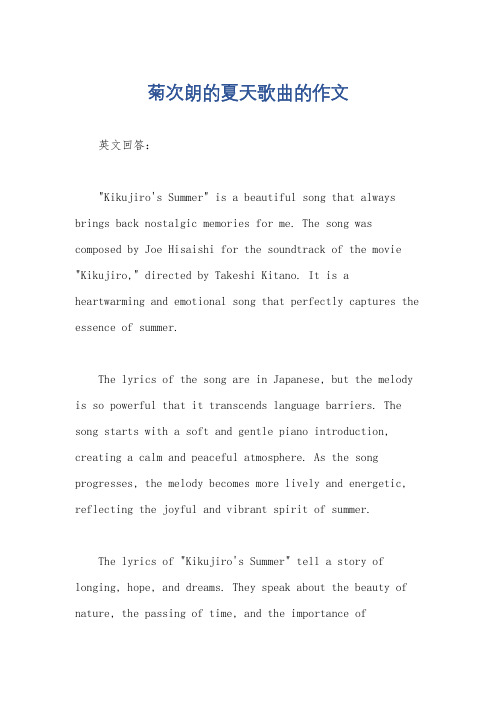
菊次朗的夏天歌曲的作文英文回答:"Kikujiro's Summer" is a beautiful song that always brings back nostalgic memories for me. The song was composed by Joe Hisaishi for the soundtrack of the movie "Kikujiro," directed by Takeshi Kitano. It is a heartwarming and emotional song that perfectly captures the essence of summer.The lyrics of the song are in Japanese, but the melody is so powerful that it transcends language barriers. The song starts with a soft and gentle piano introduction, creating a calm and peaceful atmosphere. As the song progresses, the melody becomes more lively and energetic, reflecting the joyful and vibrant spirit of summer.The lyrics of "Kikujiro's Summer" tell a story of longing, hope, and dreams. They speak about the beauty of nature, the passing of time, and the importance ofcherishing the present moment. The song reminds me of the simple pleasures of summer, like watching the sunset at the beach, having a barbecue with friends, or going on a road trip.One of the reasons why I love this song so much is because of its ability to evoke emotions and transport me to a different time and place. Whenever I listen to "Kikujiro's Summer," I can't help but feel a sense of nostalgia and warmth. It reminds me of my own childhood summers, filled with laughter, adventures, and carefree days.中文回答:《菊次郎的夏天》是一首美丽的歌曲,总能让我回忆起过去的时光。
菊次郎的夏天 影评
归途------浅析《菊次郎の夏》的艺术风格摘要:《菊次郎の夏》摒弃了北野武影片中一贯的暴力和黑暗,也抛弃了《花火》当中“蓝调”电影的创作手法,从而营造出一种平淡而温馨的氛围。
在影片中,拥有很多区别于北野武一贯风格的艺术手法存在。
也有一部分艺术手法继承了以前的影片。
在继承与创新兼备的艺术手法之中,《菊次郎の夏》成为了北野武导演电影中独树一帜的经典存在。
关键词:人物形象运动镜头AB面叙事《菊次郎の夏》采用类似”寻母两万里”的情节,描述了一个小男孩长途跋涉去寻找自己母亲的故事。
影片用清新明丽的色彩和朴实平淡又不失技术性的剪辑手法和对细节的完美追求给人们讲述了一个带有夏日凉爽荷风的回家的故事。
在故事和视听手法上都摒弃了繁复华丽,体现出片中人物心灵和影片制作手法的回归。
一、人物形象设置---导演性格的回归正南,一个被母亲抛弃,由祖母抚养长大的小男孩。
在日本一个炎热的夏季,独自在家做暑假作业,在空旷的操场上踢球,在家门口的弄堂里狂奔。
偶然地得到了母亲家的地址,点亮了他脑海里有关母亲模糊不清的那一部分。
菊次郎,一个人到中年,同样被母亲抛弃的“大男孩”。
拥有最流氓的温柔,也是最温柔的流氓。
在日本一个炎热的夏季,遇到正南。
和他一起踏上了寻母之旅。
在旅程中成长,在正南身上找寻到亲情的回归。
1、菊次郎----现实中缺失父爱的回归菊次郎,这是北野武父亲的名字。
父亲这个概念在北野武的世界里是极其淡化的。
菊次郎在北野武小时候就不在他身边了。
北野武导演回忆里,菊次郎唯一一次带他出门,遇到了美国大兵,菊次郎对大兵卑躬屈膝的态度让北野武感到屈辱。
而这也是菊次郎给北野武留下的唯一印象。
在北野武的世界,父亲这个角色是缺失的。
因此,《菊次郎の夏》中,菊次郎的出现并非无理可循。
塑造这样的人物不是为了怀念父亲,而是为了让片中的“菊次郎”代替现实生活中的菊次郎,来弥补已经缺失的父爱。
影片中,当正男看到自己妈妈已经拥有幸福家庭而悲伤哭泣的时候,菊次郎来到正南身边,安慰正男并让正男唤自己“爸爸”。
《菊次郎的夏天》影评
《菊次郎的夏天》影评“这是一部关于童年的电影,一部关于成长的电影,关于夏天的电影。
”“一个不快乐的中年人,不希望看到一个不快乐的小孩子。
是因为想起自己不快乐的童年,还是因为什么?”很多人起先都以为那个木讷内向又孤独的小男孩是菊次郎,后来到结尾处北野大叔笑着说出“是菊次郎啊!他妈的,走啦!”大家才恍然大悟,明白为什么片名叫“菊次郎的夏天”。
这张 DVD 我找了很久一直没能找到,前几天一朋友从南京帮我带了一张回来,终于才得以不用整天听着原声 OST 流哈喇子了。
带着久石让温暖而轻快的音乐,一个大叔和一个男孩的旅程就此上演,尽管此前就做好了充分被打动的准备,但在看片过程中还是不可避免的被带入了那带着阳光、向日葵、牛蒡叶和玉米地味道的夏日。
北野武大叔浑浑噩噩、神神叨叨的痞子样,初看去,除了给我们带来无奈的笑声外,就是反衬出沿途遇到的各色人情世态:变态基佬、无辜又好心的宾馆服务员、性格迥异却同样热情的恋人、周游全国的流浪诗人、收保护费的黑道打手、面恶心善的飞车族……世界并不完全纯洁,却正因此而美丽。
不学无术、无所事事、欺软怕硬、斤斤计较、气量小、爱报复、爱占小便宜……菊次郎就是这么一个随处可见的中年大叔,因为赌博输了钱而不得不徒步搭顺风车去东京,明明没什么背景却要弄一个可笑的纹身,明明不会游泳却又爱装腔作势,被人拒绝搭顺风车就偷偷砸车玻璃报复,偷拿别人的食物、为了拦车而在路面上放钉子、在庙会上为了占小便宜几近耍赖而被人揍……而就是这样一个可笑又可怜的大叔,却在千里迢迢的旅途中从未发出过后悔的怨言,仅仅为了帮小男孩圆一个看看妈妈的梦想。
很多人对两人被抛在废弃的公车站两天两夜,却没人愿意停下载他们一程的那段经历赞不绝口,说这表现出北野一直被压抑的孤独感与疏离感,这也是影片的中心正式展开之处。
影片的高潮出现在他们辛辛苦苦找到妈妈住的地方后,却发现妈妈早已改嫁,有了一个新的幸福的家庭,一个小男孩完全无法插足的家庭。
《菊次郎的夏天》影评
《菊次郎的夏天》影评当看完《菊次郎的夏天》后,我不禁被影片中那独特的魅力所深深吸引。
这部电影以其幽默、温情和感人的故事,让我在欢笑与感动中度过了一段美好的时光。
电影的主人公是一个名叫菊次郎的中年男子,他的形象十分彪悍,与一般的中年男人有所不同。
他带着一个小怪卡踏上了三千寻母的路途,途中遇到了一众怪卡,发生了许多无厘头而又温情的交集。
这些怪卡们各自有着独特的性格和故事,他们的出现为整个旅程增添了许多趣味和惊喜。
小怪卡的形象十分可爱,他长得像《机器猫》里的野比,一脸无辜和沉默,让人看了就心生喜爱。
他孤独而执着,对母亲的思念驱使着他勇敢地面对旅途中的各种困难。
最令人感动的是,他跑去为被群殴的老怪卡买药,一下一下敲着药店紧闭的大门。
这种纯真和善良让人感到无比温暖。
而老怪卡的感情发展则是非主流的,他与小怪卡之间的互动充满了温情和真挚。
他们一起经历了许多冒险,互相扶持和帮助。
海边的牵手场景更是让人感受到了他们之间深厚的情感。
电影的情节设计巧妙,在开始时可能会让人觉得有些闷,但随着故事的发展,它逐渐展现出了其魅力所在。
在就要失去耐心的时候,电影冷不丁地给观众带来了高潮,让人情不自禁地投入其中。
这种情节的转折和惊喜让人印象深刻,也增加了电影的观赏性。
影片的音乐也是其一大亮点,那轻快而动听的旋律与剧情相得益彰,让人沉浸在夏日的氛围中。
特别是电影结尾的音乐,让人在感动之余,也对这个故事留下了深刻的印象。
此外,电影还通过菊次郎的经历,探讨了一些深刻的主题,如家庭、成长和人生的意义。
菊次郎在旅途中逐渐找到了自我,也让小怪卡感受到了温暖和关爱。
这些主题的表达虽然没有过于直白,但却通过细腻的情感和情节展现得淋漓尽致。
看完这部电影后,我不禁对北野武的才华感到钦佩。
他以独特的视角和叙事方式,创造了一个充满幽默和温情的世界。
这部电影不仅让观众感受到了快乐,还触动了人们内心深处的情感。
我想,这就是电影的魅力所在。
它能够通过影像和声音,传递出一种情感、一种思考,让观众在欣赏的同时,也能够从中获得一些启示和感悟。
“Summer”的赏析音乐鉴赏
“Summer”的赏析Summer 菊次郎的夏天(Kikujiro No Natsu):炎炎夏日,微风拂过,Summer这首歌就像挂在窗边的风铃一样,摇曳着,发出阵阵清脆悦耳的声音,清新而自然。
Summer这首歌是完完全全没有用技巧作出来的歌曲,就像天然的玉璞一样不加任何雕饰。
全曲和声经计算共六个,证明久石让不仅在复杂和声方面颇有成就,在简单的和声中也能做出这样优美的曲子《菊次郎的夏天》是日本著名导演北野武1999的影片。
主要讲述小男孩正男和隔壁的叔叔菊次郎在去东京的途中发生了一系列搞笑又让人落泪的故事,本片风格清新,就像一幅田园画一般充满温馨感人的生活气息。
久石让是一个非常活跃的音乐创作人。
当低沉而略显苦涩的序曲不知不觉地转换为那清新而如夏夜凉风舒服般的钢琴时,低沉的大提琴也跟着跳跃起来。
音乐让我贪婪起来,渴望吮吸许久没有品味的甘泉!由于和“寅次郎的故事”混淆,几乎忘记了这是北野武的名著,也忘记了这是久石让的一部2000年赢得日本奥斯卡电影奖最佳音乐奖的作品!情节让我感慨而发笑,音乐却在添染色彩的同时,游离在我身体的单独某条道路,单独的体味。
听了很多久石让的作品,这部作品的风格似乎完全不同于他以往或者以后的作品,固然是因为要配合电影主题的需要,但更多的零星美感和旋律战线的自然人心给与我们太多的享受和陶醉了。
让我无论怎样也忘记不了那跳跃的钢琴和充满感情的小提琴,还有那沉稳而时刻伴随的大提琴作为《菊》这部电影的主题音乐,我们不难发现“久石让”无愧于一代配乐大师。
这部作品利用大提琴独奏拉开了故事的序幕。
随即跃上主旋律的钢琴和提琴,利用充满跳跃性的表演方式,将故事的两位主人公——天真无邪的正男和地痞混混的菊次郎——带入场景。
同时这段音乐也充分交待了这一对性格、行为完全迥异的活宝虽然旅途不顺,却始终充满着积极与乐观。
大约在作品2分钟左右的时候,一段变奏引出了故事中最令人伤感的剧情——正男的母亲已经建立了新的家庭并且有了新的孩子——可能他的母亲已经不再属于他了。
- 1、下载文档前请自行甄别文档内容的完整性,平台不提供额外的编辑、内容补充、找答案等附加服务。
- 2、"仅部分预览"的文档,不可在线预览部分如存在完整性等问题,可反馈申请退款(可完整预览的文档不适用该条件!)。
- 3、如文档侵犯您的权益,请联系客服反馈,我们会尽快为您处理(人工客服工作时间:9:00-18:30)。
Kikujiro's summer --- A Coming-of-age StoryKikujiro's summer is a Japanese movie of 1999. It is a road movie written, acted and directed by Takeshi Kitano. Unlike today’s popular movies with much dialogue and complex plots, this movie has its beautiful calmness. Separated by several chapters, this movie tells a simple story about Kikujiro’s journey of accompanying a young boy, Masao, for searching his mother during the summer vacation. Even though the result is hurtful (the boy finds out his mother has abandoned him and lives with a new family), this funny and touching odyssey presents the audients the best parts of human nature. From each chapter, one can see the growing love and the maturation of the two characters. At the end of the movie, the man totally changes his images of a gambler and becomes responsible and warm-hearted. After his gentle words of love and a series of affectionate actions, the boy is no longer lonely and dispirited. In the movie, the director Kitano uses the odds and absurd actions of a group of people to present his Japanese humor. Most members of the group are treated as the outcasts from accepted social norms. Lonely as they are, they don’t lack of humor. Their humor reflects a comfort from a shared isolation. Kikujiro's summer is not only a journey combined with sadness and happiness but also a part of childhood and a coming-of-age story.As all of our group members are speaking Chinese as the minor language, we are holding some basic knowledge about Asian culture. We chose this Japanese movie, for one reason, we think Japanese culture is similar to Chinese culture which is not hard to understand; for another reason,once entered into the 1999 Cannes Film Festival, this movie is quite famous at international level. From this representative Japanese movie, we can also compare Japanese culture with Chinese and French culture. However, this movie is sometimes quite confusing. Some of us are quite disappointed at the beginning. The two characters don’t have much conversation and the dull boy who always has his head bowed makes the film more boring. I agree that it is not an intricate or fascinating movie that we usually watched in cinema, but this movie has its attractiveness with its funny and subtle storytelling. We have a pair of comic bikers, a lone van traveler, an arguing truck driver, a fun juggling couple, prankish hitchhiking gags, and a rather extensive betting session at the bicycle races. There are occasions for sentimental tears. For instance, when the boy finds his mother has abandoned him, the man tried so hard to comfort the boy, and to cheer him up. Also, when the man takes a side trip to visit his own mother, he says nothing but only looking at his mother's lonely back. Even though the child appears to be a sulky non-smiling little boy most of the time, a boy will be a boy when it comes to play and open up to lightness of the heart. Besides the characters, we also have some discussion about the humor in the movie. One of French students in our group thinks that the main plot and comic effects of the movie are presented in old ways. Some of the comic scenes are bizarre and Japanese humor is difficult to understand. Indeed, Japanese sense of humor is different from French humor or Chinese humor. With the difference of culture and language, verbal humor is hard to be absorbed. People are more attracted by physical humor. In the movie, the comic effects are more presented by the oddness, childishness and absurdity of the man. Sometimes we think he is stupid, rude and makes trouble out of nothing, but sometimes we are touched and amused by his frankness, attentiveness and petty shrewdness. Moreover, some of us raised a query about the personal relationship in the movie. Most characters are strangers to each other. The boy doesn’t know the name of the man until the end of journey. In this complex society, it is dangerous for a young boyto go on a journey with someone unfamiliar. In the movie, the director has indeed presented some potential danger in society like the teenage bullies and the pedophile, but this ugliness of society can be covered by the kind side of human nature. The teenage bullies can be educated and the pedophile can be punished. The world is beautiful because we still have a lot of kindhearted people, like the receptionist of hotel, the fun juggling couple, the van traveler, the two bikers, the man and his wife. In our discussion, one last thing should be mentioned is the music of this movie. Admittedly, the music is the soul of the movie. The theme music “summer”is one of the most famous compositions by Hisaishi. With a light tripping rhythm,this pure and fresh music is like a cool breeze in summer that bring people refreshing and happy mood. Even though some of us may not know the movie, everyone has a feeling of familiarity about the music. At that moment, I felt that music can be a language shared by all.。
